What are Mecha Musume?
Hang around in a writing class long enough and you’re likely to hear the term “personification” tossed around. Personification, in case you need a refresher, is term used to describe the attributing of human characteristics to an inhuman object or concept. For example, saying that your car is ill-tempered or claiming that cleaning up your computer’s desktop made it happier are examples of personification.
Another term that’s used in a similar way is “anthropomorphism.” In many ways it’s the same thing as personification, but in modern connotation it’s generally used to describe giving more physical human traits to something. The 2016 Disney movie Zootopia is full of anthropomorphic animals; they have human emotions, have jobs, dress in clothes, walk on two legs; Disney loves the concept.

Now let’s take this a step further into the world of anime. Imagine that you really, like Mobile Suit Gundam or other mech based titles but you find that they have a depressing lack of overly cute young girls. “If only there was a healthy dose of moe to go along with these robots.” You say to yourself. Well if that’s the case, then you need to enter the world of mecha musume.
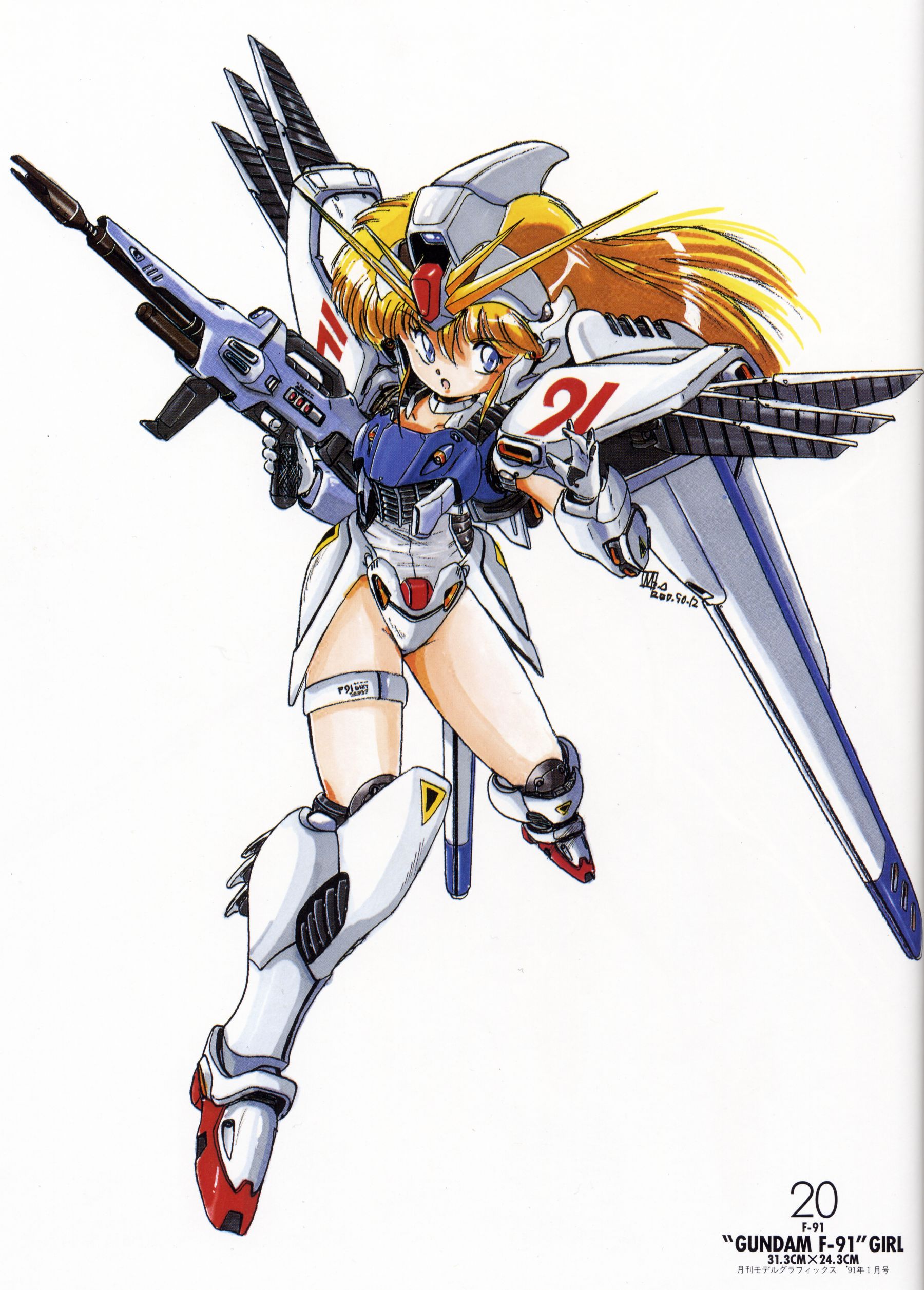
Mecha musume can directly translate from Japanese to English as "mechanical/mech girl." As is often the case though, there's quite a bit lost in translation. Mecha musume takes two very prevalent concepts in anime; mechanical armor and moe, and pushes them together in a quite literal merger, depending on the artist doing the pushing. Moe is a term that has grown in connotation over time to basically come to describe the appearance of someone with an intense amount of cute, endearing charm and innocence. In general this term gets applied to characters that are young girls with a generally accepted overly cute appearance to the extent that they appear meek in order to instill a sense of protective compassion from other characters, in addition to the reader or viewer. So now, take a machine, mechanical armored suit, or something of the sort, and draw the concept of it as a moe girl, and you have mecha musume.
There’s an important distinction to be had between female robots, cyborgs, etc. and mecha musume characters that goes back to the ideas of personification and anthropomorphism. Mahoro, from the anime Mahoromatic, is a female android and Henrietta, Rico, and Triela from Gunslinger Girl are cyborgs. None of them are characters that are based on personifying a nonhuman object so much as they are a robot intended to be human like, or in the case of the Gunslinger Girls, women who were entirely human to start.
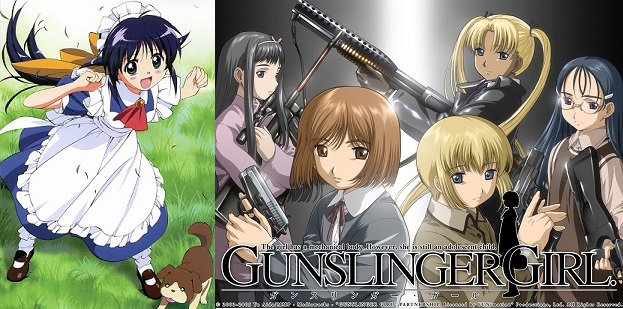
Not mecha musume.
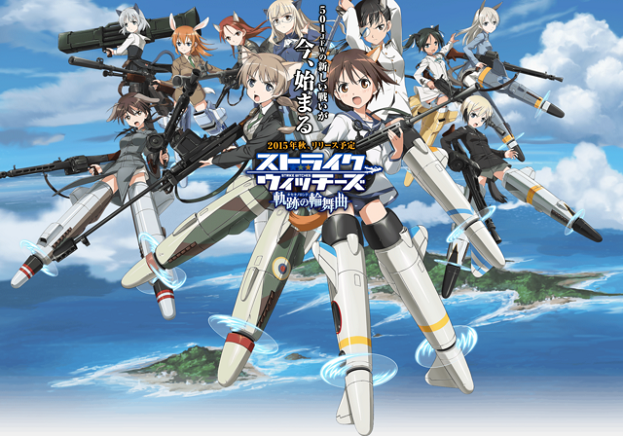
Mecha musume.
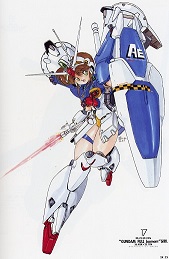 Compare them to the characters of Strike Witches and the contrast is more apparent. These girls essentially are weaponized mechs, clothed in the appearance of a young girl, but still taking on a somewhat mechanical appearance, often only when engaged in a conflict. The term "mecha musume" first originated in 2006 thanks to a series of figurines that were produced by Konami. However, much of the inspirations for mecha musume can be traced back to the late 1980’s and the work of doujin artist Mika Akitaka. Akitaka gained popularity through his MS Girls art that was routinely featured in the monthly magazine publication Gundam Ace. As the name suggests, MS Girls consisted of drawings of girls combined with elements of Gundam mobile suits. They ranged from what could appear to be a young girl wearing pieces of mobile suit armor, to having an entirely mecha body, but with a feminine form and face. Akitaka was more than just a doujin artist. He worked on several Mobile Suit Gundam animation projects, including Mobile Suit Gundam ZZ, Mobile Suit Gundam 0080: War in the Pocket, Mobile Suit Gundam: Char’s Counterattack, and years later the Mobile Suit Gundam Unicorn OVA. His distinctive MS Girls creations were never brought to anime however―they remained a side project.
Compare them to the characters of Strike Witches and the contrast is more apparent. These girls essentially are weaponized mechs, clothed in the appearance of a young girl, but still taking on a somewhat mechanical appearance, often only when engaged in a conflict. The term "mecha musume" first originated in 2006 thanks to a series of figurines that were produced by Konami. However, much of the inspirations for mecha musume can be traced back to the late 1980’s and the work of doujin artist Mika Akitaka. Akitaka gained popularity through his MS Girls art that was routinely featured in the monthly magazine publication Gundam Ace. As the name suggests, MS Girls consisted of drawings of girls combined with elements of Gundam mobile suits. They ranged from what could appear to be a young girl wearing pieces of mobile suit armor, to having an entirely mecha body, but with a feminine form and face. Akitaka was more than just a doujin artist. He worked on several Mobile Suit Gundam animation projects, including Mobile Suit Gundam ZZ, Mobile Suit Gundam 0080: War in the Pocket, Mobile Suit Gundam: Char’s Counterattack, and years later the Mobile Suit Gundam Unicorn OVA. His distinctive MS Girls creations were never brought to anime however―they remained a side project.
As mentioned earlier, the actual term of “mecha musume” didn’t come into being until the mid 2000’s and the work of artist Fumikane Shimada (Humikane). Shimada’s designs were used to make a series of figurines, produced by Konami, under the title of “mecha musume.”
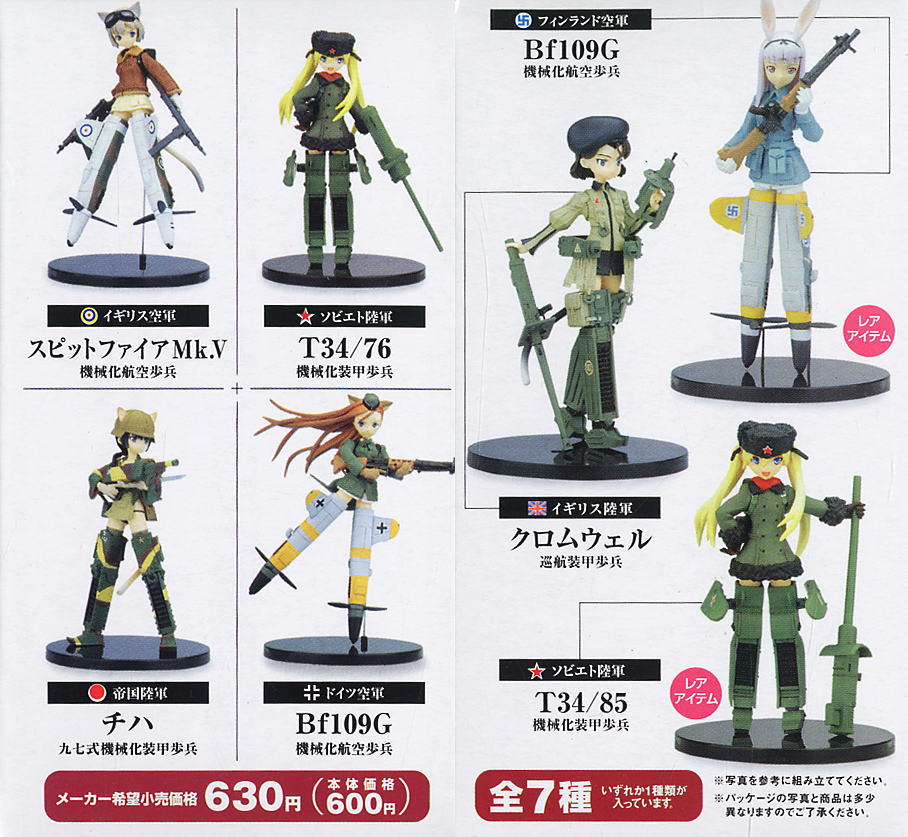 Three volumes of figures were produced by the company, furthering the popularity of the concept, and the artist behind them.
Three volumes of figures were produced by the company, furthering the popularity of the concept, and the artist behind them.
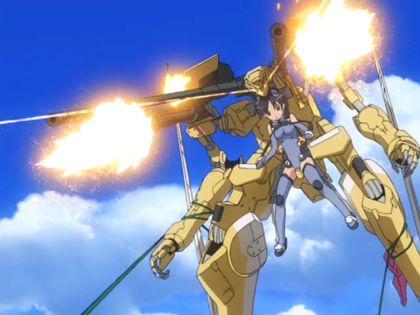 Shimada’s artwork and designs led to him designing characters for two heavily mecha musume inspired anime; Sky Girls and Strike Witches. Sky Girls cast of characters are a lesser form of a mechanized moe personification as the girls are physically normal but are able to wield and control mechanized exoskeletons. The girls of Strike Witches however are much truer to the idea of mecha musume as their bodies are a much more integral part of their armor, with their legs notably being a significant part of their combat suits.
Shimada’s artwork and designs led to him designing characters for two heavily mecha musume inspired anime; Sky Girls and Strike Witches. Sky Girls cast of characters are a lesser form of a mechanized moe personification as the girls are physically normal but are able to wield and control mechanized exoskeletons. The girls of Strike Witches however are much truer to the idea of mecha musume as their bodies are a much more integral part of their armor, with their legs notably being a significant part of their combat suits.
 Taking a completely different approach to the mecha musume genre is the title Upotte!! Though Shimada worked as a consultant on the series, the female cast of characters here don’t look mechanical in the least, they instead embody the traits and characteristics of various guns. The series main character for example, is Funco, based on the Belgian FN FNC assault rifle. Because the rifle has a thin, skeleton stock (otherwise known as butt) Funco wears a thong. Her best friend, Ichiroku is based on an American M16A4 assault rifle, which is capable of firing in three round bursts, and so her character exhibits quick bursts of energy followed by periods of rest. Upotte!!’s reliance on personification and embodiment don’t necessarily fit with what’s considered the "look" of mecha musume, but based on the definitions of personification and anthropomorphism, they actually hold truer to the spirit of the concept than the women of Sky Girls who may look the part, but are more of an animated version of Ripley piloting the exoskeleton in the movie Aliens.
Taking a completely different approach to the mecha musume genre is the title Upotte!! Though Shimada worked as a consultant on the series, the female cast of characters here don’t look mechanical in the least, they instead embody the traits and characteristics of various guns. The series main character for example, is Funco, based on the Belgian FN FNC assault rifle. Because the rifle has a thin, skeleton stock (otherwise known as butt) Funco wears a thong. Her best friend, Ichiroku is based on an American M16A4 assault rifle, which is capable of firing in three round bursts, and so her character exhibits quick bursts of energy followed by periods of rest. Upotte!!’s reliance on personification and embodiment don’t necessarily fit with what’s considered the "look" of mecha musume, but based on the definitions of personification and anthropomorphism, they actually hold truer to the spirit of the concept than the women of Sky Girls who may look the part, but are more of an animated version of Ripley piloting the exoskeleton in the movie Aliens.
 Compare this to a similar military theme in the game turned anime, Kantai Collection: KanColle. Instead of guns, the girls in this franchise are imbued with the spirits of Japanese warships, and their appearances in battle reflect this in a much more direct mecha musume style than the girls of Upotte!!. As it would just so happen, one of the artists involved in designing some of the characters for the game was Humikane. The argument could be made based off of this that mecha musume is more aesthetically than conceptually pleasing to its fans. Its origins, after all, don’t lie with storytelling, but with doujin art and figurines. Outside of Shimada’s contributions to anime, there’s not a lot of mecha musume to be found in either OVA’s or series. There’s plenty of mecha titles, a lot of moe series, but only a select few that actually bring them together.
Compare this to a similar military theme in the game turned anime, Kantai Collection: KanColle. Instead of guns, the girls in this franchise are imbued with the spirits of Japanese warships, and their appearances in battle reflect this in a much more direct mecha musume style than the girls of Upotte!!. As it would just so happen, one of the artists involved in designing some of the characters for the game was Humikane. The argument could be made based off of this that mecha musume is more aesthetically than conceptually pleasing to its fans. Its origins, after all, don’t lie with storytelling, but with doujin art and figurines. Outside of Shimada’s contributions to anime, there’s not a lot of mecha musume to be found in either OVA’s or series. There’s plenty of mecha titles, a lot of moe series, but only a select few that actually bring them together.
If you do a google search for mecha musume however, the amount of artwork you’ll find is vast and varied. Thanks to the long-running popularity of mech-based anime and the ubiquitous nature of moe, the combination of the two is rife with possibilities for fans, even if it’s not a fruitful subject for anime series creators. Shimada’s contributions as well as the popularity of the game Kantai Collection have helped considerably.
Personification and anthropomorphism can take on various forms, as seen just in how varied mecha musume itself is. Whether its girls who embody the personalities of a weapon, machine, or vehicle, or girls whose mechanized shells are an extension of their physical selves, this specific kind of anthropomorphism has been around for over three decades. What started with Mika Akitaka has continued with Fumikane Shimada. Thanks to the latter’s influence in the genre, mecha musume has found its way from the sketchbook to the television screen, while the abundance of sites such as Deviant Art have kept the doujin origins of it alive and well.
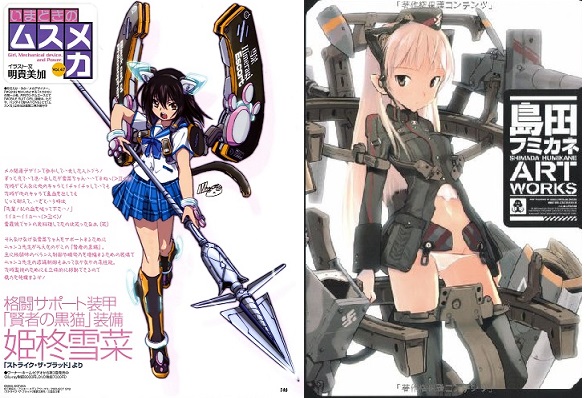
In short, if you’ve ever really liked mechs, and then regretted that they weren’t cute enough to have a mild crush on, there’s joy and salvation to be had, and mecha musume is its name.




